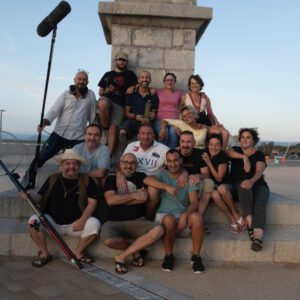
In front of an audience of over four hundred people, suitably distanced and masked, in the stadium of Marina di Pisa – a historic seaside resort not far from the town of the Leaning Tower – the presentation of the film “La Banda”, produced by the Associazione Culturale Cantiere Nuovo, took place. The web series was devised by Nico Malvaldi (film editor) and Luca Serasini (series director), photographer and artist respectively, from Pisa, or rather, Marina di Pisa. A small town with a population of about four thousand which, since it is so beautiful and on the sea, has been much loved by numerous figures from the world of art, from the poet Gabriele D’Annunzio to the painter Giuseppe Viviani, as well as being the location and backdrop for art-house films.
I was happy to accept an invitation, I’ve always thought of Marina di Pisa as a special place anyway; a bit run-down, but special. Characterized by cool evenings and endless sunsets, it’s also an inseparable companion on long walks, great for collecting one’s thoughts.
After about an hour’s viewing time – seven mini-episodes – the series was met with good-humored applause and smiles. The series explores in depth the locations and typical streets of Marina di Pisa, showing the inhabitants living out their daily lives. The cast, almost all locals (auditions were open to everyone, also non-locals, respecting principles of inclusivity and integration and not following the typical Tuscan attitude of narrow-minded parochialism), without professional actors, is made up exclusively of people and characters (all too realistic) tied to their town, history, shores and colors. The fresh air and salty wind, the house facades ready to defy the wet sea breezes and the crashing waves of the sea in winter.
This is an important work, bearing in mind the philosophy that pervades it and that gave rise to it, originating years ago in an idea, slowly nurtured but consistently pursued, which spurred the local people to devote time and resources to this collective project.
It’s a topical story that develops following the firing of a cook (unable to make French crêpes) employed in the splendid Marina di Pisa harbor, which was suddenly sold “to the French”. In fact, a rich yacht owner had mistakenly thought he was in Viareggio, expecting to be surrounded by ritzy splendor.
 The plot is amusing, the script excellent. The characters, realistic and plain-speaking, speak their own language – equally blunt – yet the contents are universal, in which Big Fish Eat Little Fish, to quote from a 1556 engraving by Pieter Bruegel, without anyone defending them! It’s a question of “the government deficit is active in the economy”, or at least that’s what the director makes a boy say to his friend, with an explicit reference to the Modern Monetary Theory – MMT, discussed by Stephanie Bell Kelton in her “The Deficit Myth”.
The plot is amusing, the script excellent. The characters, realistic and plain-speaking, speak their own language – equally blunt – yet the contents are universal, in which Big Fish Eat Little Fish, to quote from a 1556 engraving by Pieter Bruegel, without anyone defending them! It’s a question of “the government deficit is active in the economy”, or at least that’s what the director makes a boy say to his friend, with an explicit reference to the Modern Monetary Theory – MMT, discussed by Stephanie Bell Kelton in her “The Deficit Myth”.
In the end, words of freedom and gender equality emerge and are written down, to be masterfully spoken by the kids playing football, males and females, who show that they are well aware of the difference between men and women, but also respectful of rights. The reference to Megan Rapinoe, the gay US soccer player who complained to the soccer federation by filing a lawsuit about the need for equal pay for men and women, was inevitable. Finally, the delicate question of immigration is brushed over, since “travelling teaches tolerance and if we all traveled, even just for one day, we would understand the issue better”. And so on. The script is serious and light in tone at the same time, imbued with irony and truth, evoking smiles and laughter.

But I felt most emotionally involved in the moments when the attachment to origins is highlighted, the lifestyle of the true-blue Marinese, who makes the “real ponce” with cognac, rum, coffee, sugar and lemon rind – “it is drunk in August”, or who claims that “he’s never had money, fear or seasickness!”. Certain expressions reveal the humanity of these “sea folk” –with whom I feel a kinship; I too was born and brought up at the seaside. Attached to their land and streets, to the pebbles on the seashore; to their origins and customs passed on by family and friends; traditions, a lifestyle informed by solid, simple values. But it is in that very authenticity that we discover that they pertain to everyone, all over the world.
The film was made with the community and for the community of Marina di Pisa. A work that values the unique qualities of each person and the personalities of the various characters, but also their fantastic open-minded and level-headed mentality, perhaps caused by the caresses – but also the blows – that only the local winds can deliver.
A final note: I discovered that Nico Malvaldi is a photographer who has lived in the USA for twenty years and in New York for fifteen. While Luca Serasini is an artist. I’m definitely going to find out more about their stories. Finally, the film was shot by Andrea Malvaldi, the script written by Enrico Caroti Ghelli; the music composed by Francesco Bottai, Pisan singer-songwriter, guitarist and theatre actor, as well as co-founder of the Pisan band, I Gatti Mézzi.
“La Banda” was created with the technical support of Corte Tripoli Cinematografica.












